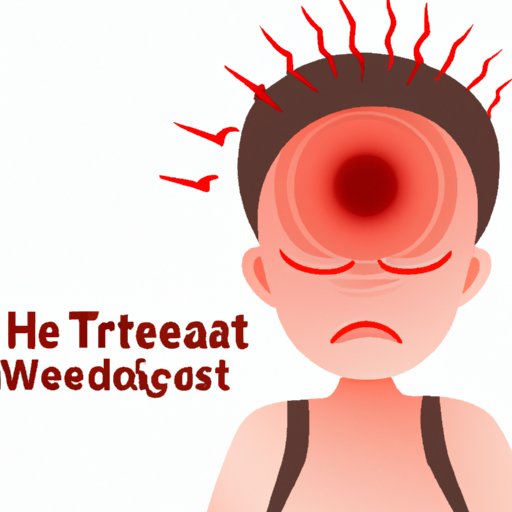
I. Introduction
When it’s hot outside, you might find yourself feeling sluggish and tired, struggling to stay awake and alert. But why exactly does heat make you tired? Understanding the science behind this phenomenon and taking the proper precautions can help you feel more comfortable and energized when temperatures rise.
In this article, we’ll explore the reasons why heat can cause fatigue and drowsiness, as well as provide tips for staying cool and alert. From understanding the body’s response to heat to learning how to prevent heat exhaustion and improve sleep quality during the summer months, this guide will cover everything you need to know about managing heat-induced fatigue.
II. The Science behind Feeling Lethargic in a Heat Wave: Understanding Why Heat Can Put You to Sleep
To understand why heat can make you tired, it’s important to first consider how the body reacts to temperature changes and regulates its internal environment. When you get too hot, your body works to cool itself down through mechanisms like sweating and blood vessel dilation.
The hypothalamus, a small structure in the brain, plays a crucial role in regulating body temperature. It helps the body maintain a consistent internal temperature, even in the face of external heat sources. However, this process can be energy-intensive, causing your body to feel fatigued and lethargic after prolonged exposure to heat.
III. Hot Temperatures Draining Your Energy? Here’s Why and What You Can Do About It
Heat exhaustion is a common condition that occurs when the body becomes overheated and can no longer regulate its own temperature effectively. Symptoms of heat exhaustion can include fatigue, dizziness, headache, and a rapid heartbeat.
To prevent heat exhaustion, it’s important to stay hydrated and cool, especially when spending significant time outdoors during hot weather. You should aim to drink plenty of water and avoid sugary or alcoholic beverages that can dehydrate you further. Additionally, taking regular breaks in shaded or air-conditioned areas can help regulate your body temperature and prevent overheating.
IV. Does Heat Make You Tired? Yes, and Here’s Why
Beyond the physical effects of heat on the body, there are also psychological factors that can contribute to fatigue and drowsiness. One of these factors is the relationship between body temperature and melatonin, a hormone that plays a key role in sleep regulation.
Studies have shown that when the body temperature is elevated, levels of melatonin can decrease, making it more difficult to fall asleep and stay asleep. This can lead to disrupted sleep patterns and increased feelings of fatigue during the day.
V. The Connection Between Heat and Drowsiness: How to Cope with Feeling Sleepy in Summer
Getting sufficient rest and sleep is critical for maintaining energy levels and overall health, especially during hot weather. However, many people struggle to sleep well when temperatures are high, making it difficult to feel alert and awake during the day.
To improve the quality of your sleep during the summer months, it’s important to create a comfortable sleeping environment that is conducive to rest. This might include investing in a fan or air conditioning unit, using lightweight and breathable bedding, and taking steps to reduce noise and light pollution in your sleeping area.
VI. Heat-Induced Fatigue: Causes, Symptoms, and Precautions to Take
Heat-induced fatigue is a specific type of fatigue that occurs as a result of prolonged exposure to high temperatures. This condition can affect anyone, but is particularly common in athletes, outdoor workers, and the elderly. Symptoms of heat-induced fatigue can include weakness, exhaustion, and difficulty concentrating.
To prevent heat-induced fatigue, it’s important to take breaks in cool, shaded areas, hydrate frequently, and avoid overexerting yourself in hot weather. Additionally, it may be helpful to adjust your work or exercise schedule to avoid the hottest times of the day, or to wear lightweight and breathable clothing to help regulate your body temperature.
VII. How Hot Weather Affects Your Body and Mind, Leading to Drowsiness and Exhaustion
In addition to the physical effects of heat on the body, hot weather can also impact your cognitive and emotional state. For example, research suggests that high temperatures can lead to increased irritability, decreased motivation, and impaired decision-making abilities.
To manage the effects of hot weather on your mental and emotional well-being, it’s important to practice self-care and engage in activities that help you feel calm and relaxed. This might include meditation, deep breathing exercises, or spending time in nature.
VIII. Keeping Your Cool: Tips for Beating the Heat and Staying Alert and Energetic
There are a number of practical steps you can take to manage heat-induced fatigue and feel more alert and energized in hot weather. These might include staying hydrated, eating a balanced diet rich in electrolytes and nutrients, and dressing appropriately for the weather.
Additionally, taking regular breaks in cool, shaded areas and avoiding strenuous activity during the hottest times of the day can help prevent overheating and exhaustion. Finally, it’s important to practice good sleep hygiene and create a comfortable sleeping environment that promotes rest and relaxation.
IX. Conclusion
Heat-induced fatigue is a common and often frustrating experience during the summer months. However, by understanding the science behind this phenomenon and taking the proper precautions to stay cool, hydrated, and rested, you can manage these symptoms and feel more energized and alert when temperatures rise.
Remember to prioritize self-care and take breaks as needed, and don’t hesitate to seek medical attention if you experience severe or persistent symptoms of heat exhaustion or heat stroke. By taking care of yourself during hot weather, you can enjoy all the best that summer has to offer without feeling weighed down by fatigue and lethargy.




